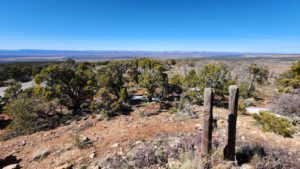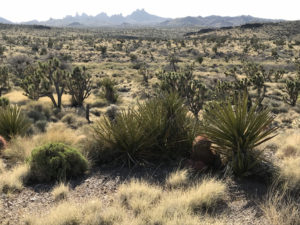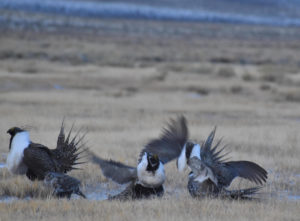 by Dr. Erin Anchustegui
by Dr. Erin Anchustegui
People often ask me what I teach at Boise State University and the answer invariably engenders glazed eyes, looks of puzzlement, or long, breathy yawns. Environmental ethics and logic are, unfortunately, seen to be dull and superfluous by so many people. More importantly, this indifference often silently sanctions the careless destruction of public land habitats and ecosystems. As an educator, I try to tackle this indifference by uniting environmental ethics and activism in the minds of students. Moreover, I teach my students that effective activism cannot proceed without a philosophical understanding of its own ethical motives and goals.
This brings me to Aldo Leopold’s land ethic and WWP. One of more impressive aspects of WWP, in my opinion, is its explicit endorsement of Leopold’s land ethic. This ethic emerges time and time again in WWP’s successful endeavors to protect public land. I spend a fair amount of time in my environmental ethics course teaching Leopold’s land ethic, its logical implications, and how to apply it to real life cases. In my opinion, it is the only ethic that can ground an over-arching environmental ethic.
Last November when Jon Marvel spoke at BSU, students got to see how WWP utilizes this land ethic. For the first time, many learned about the destruction, collusion, and hypocrisy surrounding public land management. Public lands suffer widespread destruction, in part, due to the common, but false assumption that the land and its inhabitants have only economic value. Leopold opposed this assumption stridently in his defense of the land ethic. With the help of Marvel’s presentation, I was able to bring home to students how important it is to have a land ethic that requires that we respect nature for its intrinsic, non-economic value. The final upshot of his presentation was that students experienced the coalescence of philosophical theory and environmental activism first-hand.
I look forward to Jon’s return to BSU next fall for the endangered species and public lands colloquium. I hope to recreate this learning experience for a new group of students and hopefully replace some of their indifference with a genuine respect for the land and all of nature.
******************
“We reached the old wolf in time to watch a fierce green fire dying in her eyes. I realized then, and have known ever since, that there was something new to me in those eyes – something known only to her and to the mountain. I was young then, and full of trigger-itch; I thought that because fewer wolves meant more deer, that no wolves would mean hunters’ paradise. But after seeing the green fire die, I sensed that neither the wolf nor the mountain agreed with such a view.”
-Aldo Leopold Thinking Like a MountainAldo Leopold (1887-1948) is considered the father of wildlife ecology. He is best known for his book, A Sand County Almanac. The Almanac reflects a lifetime of observation and thought. It led to a philosophy for discovering what it means to live in harmony with the land.
The roots of Leopold’s concept of a “land ethic” can be traced to his birthplace on Mississippi River in Iowa. As a youngster, he developed an appreciation in the natural world from countless hours of adventure in the woods, prairies, and river backwaters of a relatively wild Iowa. His passion and skills in observation and writing lead him to a degree in forestry.
Leopold joined the Forest Service in the Arizona Territories. Here he began to see the land as an organism and developed the concept of community. This concept became the foundation for his later work. In 1924, he accepted a transfer to the U.S. Forest Products Laboratory where he served as associate director, and began teaching at the University of Wisconsin in 1928.
Credited as the father of wildlife ecology, Leopold’s book Game Management (1933) defined the skills and techniques for managing and restoring wildlife. Soon after its publication, the University of Wisconsin created the Department of Game Management and appointed Leopold as its first chair.
In 1935, the Leopold family purchased a worn-out farm near Baraboo, in an area known as the sand counties. It is here Leopold put into action his beliefs that the tools people used to disrupt the landscape could be used to rebuild it. It was here Leopold visualized what was to become his most influential work, A Sand County Almanac.
Erin Anchustegui teaches philosophy at BSU. She has a Ph. D in philosophy and does research in environmental ethics relating specifically to the works of Aldo Leopold.
This article appeared in the Watersheds Messenger – Summer 2005 – (Vol. XII, No. 2)![]()
Check out WWP’s archive of our semi-annual publication, the Watersheds Messenger






